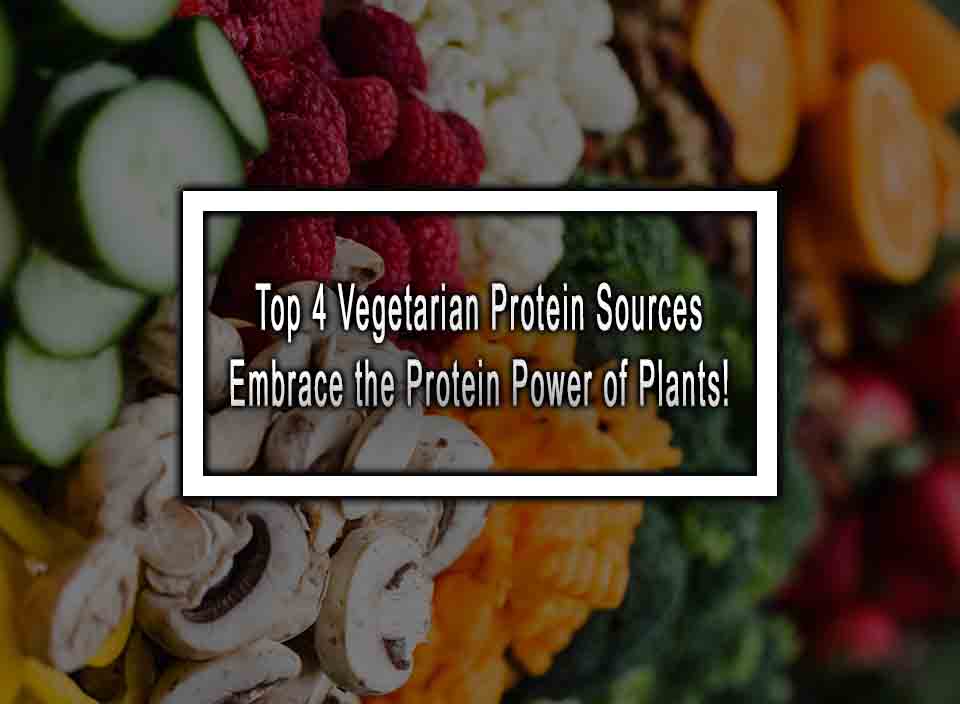Vegetarian Protein Sources: Unleashing the Delicious World of Vegetarian Options!
We all know that protein is essential for our bodies to function optimally. While many think that meat is the only protein source, vegetarians have many options too! From legumes to grains and even plant-based meats, there’s a wide range of delicious and nutritious choices available. Whether you’re a lifelong vegetarian or simply looking to incorporate more meatless meals into your diet, we’ve got you covered. Get ready to discover the top vegetarian protein sources that will leave you feeling satisfied and full of energy!
1. Lentils: Tiny But Mighty Protein Powerhouses
Lentils are one of the most versatile and protein-packed foods out there. With a whopping 18 grams of protein per cooked cup, they easily earn their place on our list. From hearty lentil soups and stews to flavorful lentil burgers, the possibilities are endless. Plus, lentils are also rich in fiber, iron, and folate, making them a nutritional powerhouse you don’t want to miss out on.
2. Quinoa: The Complete Protein Grain
Move over, rice. Quinoa is here to claim its much-deserved spotlight! This ancient grain is not only packed with protein (8 grams per cooked cup) but is also considered a complete protein. That means it contains all nine essential amino acids our bodies need. Quinoa can be enjoyed as a side dish, added to salads, or used as a base for delicious grain bowls, making it a versatile and nutritious option.
3. Greek Yogurt: Creamy and Protein-Rich
Greek yogurt not only adds a creamy texture to your dishes but is also an excellent source of protein. With around 23 grams of protein per 8 ounces, it easily outshines regular yogurt. Enjoy it as a standalone snack, blend it into smoothies, or use it as a topping for your favorite vegetarian curries. Don’t forget to choose unsweetened options to keep your sugar intake in check.
4. Chickpeas: The Humble Yet Mighty Legume
Chickpeas, also known as garbanzo beans, are a staple in Mediterranean and Middle Eastern cuisine. Packed with approximately 15 grams of protein per cup, these little legumes are a fantastic option for vegetarian protein. Whip up some homemade hummus, toss them into salads, or roast them with your favorite spices for a protein-packed snack. The culinary possibilities are endless with chickpeas!
Conclusion
In conclusion, vegetarian protein sources are as varied and delicious as their meat counterparts. Whether you’re a vegetarian, vegan, or simply curious about incorporating more plant-based options into your diet, these top vegetarian protein sources have got you covered. From lentils and quinoa to Greek yogurt and chickpeas, there are plenty of options to choose from. So, get creative in the kitchen, experiment with different recipes, and enjoy the benefits of a protein-rich vegetarian diet. Your taste buds and body will thank you for it!
Vegetarian Protein Sources FAQs
Here are the most common questions about vegetarian protein sources.
1. How much protein do I need as a vegetarian?
The recommended daily intake of protein for adults is about 0.8 grams per kilogram of body weight. This means that a vegetarian should aim to consume enough protein based on their weight and individual needs.
2. Can I get all the essential amino acids from vegetarian protein sources?
Yes, vegetarian protein sources do contain all the essential amino acids. However, it is important to consume a variety of different protein sources to ensure you get all the necessary amino acids.
3. Do I need to combine different vegetarian protein sources to get complete proteins?
While it used to be believed that you needed to combine different protein sources at each meal to obtain complete proteins, it is now known that as long as you consume a variety of vegetarian protein sources throughout the day, you will get all the necessary amino acids.
4. How can I incorporate more vegetarian protein into my diet?
You can incorporate more vegetarian protein into your diet by adding beans or legumes to salads or soups, using tofu or tempeh in stir-fries or salads, including quinoa or lentils as a side dish, and snacking on nuts or seeds.
5. Are vegetarian protein sources as effective as animal protein sources?
Yes, vegetarian protein sources are just as effective as animal protein sources in providing the body with the necessary amino acids and supporting muscle growth and repair. They can be part of a well-balanced vegetarian or vegan diet.












